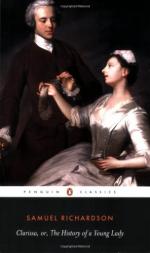The Colonel then went on to the good effect your airing had upon you; to your good wishes to Miss Howe and Mr. Hickman; and to your concluding sentence, that when the happy life you wished to her comes to be wound up, she may be as calm and as easy at quitting it, as you hope in God you shall be. Your mother could not stand this; but retired to a corner of the room, and sobbed, and wept. Your father for a few minutes could not speak, though he seemed inclined to say something.
Your uncles were also both affected; but your brother went round to each, and again reminded your mother that she had other children.—What was there, he said, in what was read, but the result of the talent you had of moving the passions? And he blamed them for choosing to hear read what they knew their abused indulgence could not be a proof against.
This set Mr. Morden up again—Fie upon you, Cousin Harlowe, said he, I see plainly to whom it is owing that all relationship and ties of blood, with regard to this sweet sufferer, are laid aside. Such rigours as these make it difficult for a sliding virtue ever to recover itself.
Your brother pretended the honour of the family; and declared, that no child ought to be forgiven who abandoned the most indulgent of parents against warning, against the light of knowledge, as you had done.
But, Sir, and Ladies, said I, rising from the seat in the window, and humbly turning round to each, if I may be permitted to speak, my dear Miss asks only for a blessing. She does not beg to be received to favour; she is very ill, and asks only for a last blessing.
Come, come, good Norton, [I need not tell you who said this,] you are up again with your lamentables!—A good woman, as you are, to forgive so readily a crime, that has been as disgraceful to your part in her education as to her family, is a weakness that would induce one to suspect your virtue, if you were to be encountered by a temptation properly adapted.
By some such charitable logic, said Mr. Morden, as this, is my cousin Arabella captivated, I doubt not. If virtue, you, Mr. James Harlowe, are the most virtuous young man in the world.
I knew how it would be, replied your brother, in a passion, if I met Mr. Morden upon this business. I would have declined it; but you, Sir, to his father, would not permit me to do so.
But, Sir, turning to the Colonel, in no other presence——
Then, Cousin James, interrupted the other gentleman, that which is your protection, it seems, is mine. I am not used to bear defiances thus— you are my Cousin, Sir, and the son and nephew of persons as dear as near to me—There he paused—
Are we, said your father, to be made still more unhappy among ourselves, when the villain lives that ought to be the object of every one’s resentment who has either a value for the family, or for this ungrateful girl?
That’s the man, said your cousin, whom last Monday, as you know, I went purposely to make the object of mine. But what could I say, when I found him so willing to repair his crime?—And I give it as my opinion, and have written accordingly to my poor cousin, that it is best for all round that his offer should be accepted; and let me tell you—




